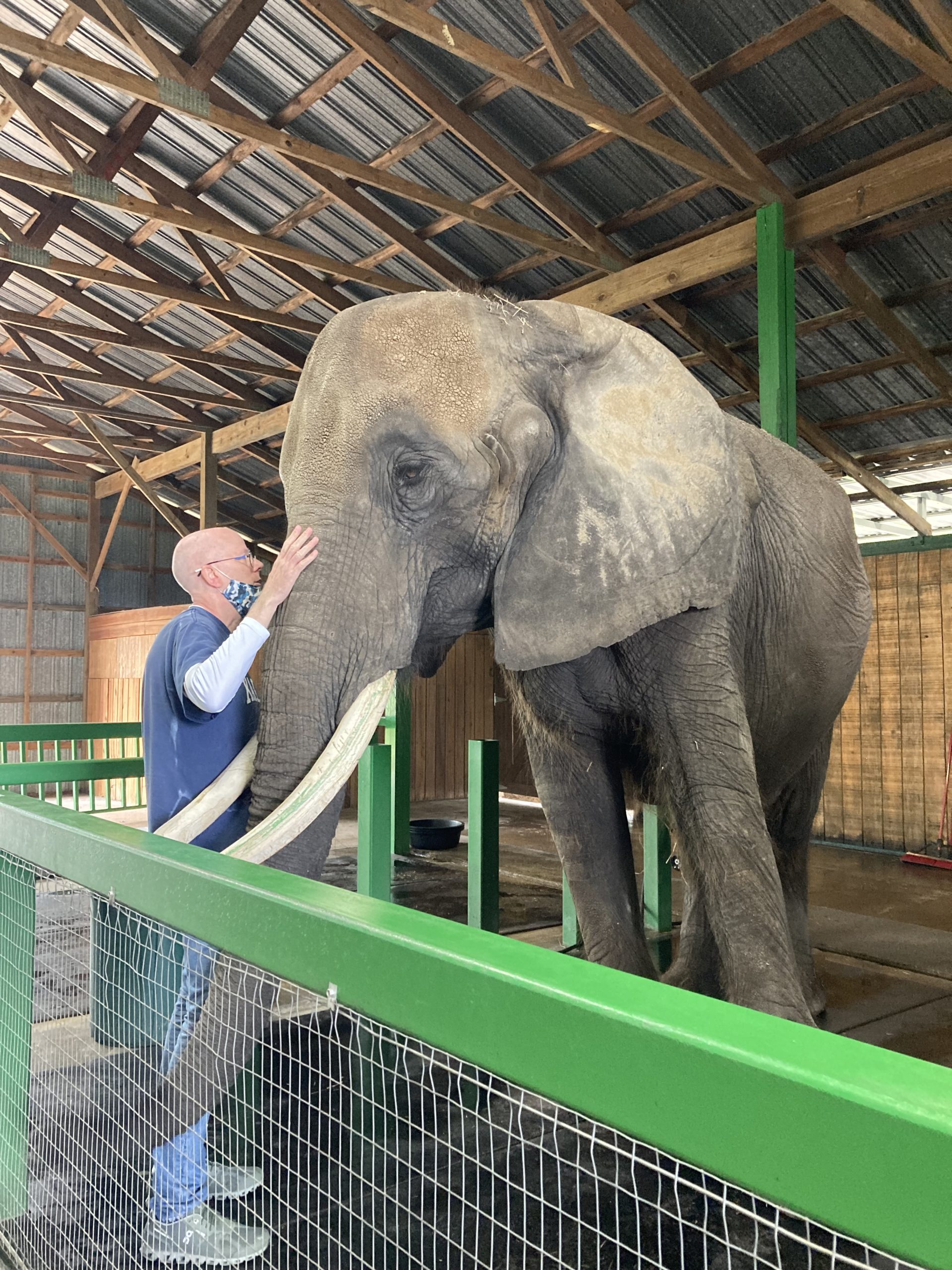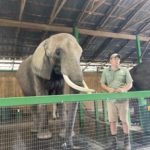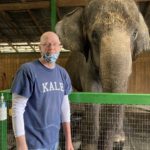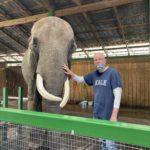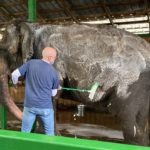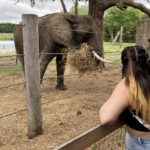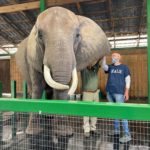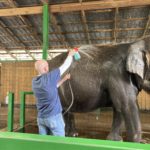Standing next to an elephant is kind of like standing next to God. You quickly realize in your humility, that he or she is far more important than you are. I have always loved elephants, and I was lucky enough to see them in the wild many years ago in South Africa. So, you can imagine my excitement when I had the opportunity to spend time with a few of these magnificent beings up close.
Elephants have been around a lot longer than human beings. According to Sangita Iyer, “Greed, selfishness, corruption, apathy, and complacency are part of the deeper issues decimating our planet’s natural world and its inhabitants. Elephants, for instance, arrived on the planet some 80 million years ago, whereas humans arrived just a few thousand years ago. According to a study entitled Biomass Distribution on Earth, humans make up only 0.02 per cent of the earth’s biomass. Yet we have destroyed 83 per cent of the wildlife due to our reckless actions.”
Did you know that elephants have the largest brains of any mammal on the face of the Earth? I once briefly worked with the curator of the Central Park Zoo who described elephants as being “scarily smart”. In fact, according to the World Wildlife Fund (WWF), “The elephant’s temporal lobe (the area of the brain associated with memory) is larger and denser than that of people, hence the saying ‘elephants never forget’.” Elephants are also plant-based eaters who have a strong sense of family, and mourn the loss of a loved one. Moreover, they play an important role in our fight against the climate crisis too. How so? Elephants have been referred to as “gardeners of the planet” as they roam vast areas for significant periods of time eating plants and seeds and dispersing their poop (about 250 pounds per day, per elephant). These seeds become trees, and the trees provide us with oxygen, while also absorbing carbon dioxide.
Elephants are critical to the other species living in their ecosystems as well as they have a remarkable ability to find water (possibly through the use of infrasounds and the tamping of the ground). Elephants can also hear at frequencies 20 times lower than humans which allows them to communicate with each other at great distances (multiple miles).
Besides being incredibly smart, perhaps the coolest attribute of an elephant is her trunk. An elephant’s trunk can lift up to 730 pounds and is pure muscle. According to National Geographic, “An elephant’s trunk is actually a long nose used for smelling, breathing, trumpeting, drinking, and also for grabbing things—especially a potential meal. The trunk alone contains about 40,000 muscles. African elephants have two fingerlike features on the end of their trunk that they can use to grab small items.” Wow.
So, what’s not to love about these beautiful, gentle giants? Nothing. Which makes it all the more distressing to learn that about 90% of African elephants have been wiped out in the past century (largely due to the ivory trade) with only 415,000 remaining. The data is even more dreadful for Asian elephants as only 40,000 remain in the wild.
But it gets worse. I have read a couple of books on elephants over the years, and I have learned that no animal performs unnatural tasks or acts without being abused. Elephant abuse can be extreme and life threatening, and can take the forms of whippings and beatings (often with bull hooks), food and water deprivation, as well as other sensory manipulations and torment. According to Sanjita Iyer, “It was hard to comprehend the insurmountable emotional and psychological torture that captive elephants must suffer. Unable to toss mud on their backs or even scratch their own bodies, they are deprived of basic freedoms and stripped of their dignity. They are reduced to slaves to serve the whims of their masters. Shackled day and night, they live a desolate life and die a miserable death. It was difficult to understand how conscious human beings could capture and decimate these awesome animals, pushing them to the brink of extinction in the process.”
Whether it is in the name of religion or entertainment (circuses, traveling acts, and many zoos (PETA estimates that there are currently 69 elephants in the US being exploited for circuses)), elephants are being abused, tortured, and killed all over the world at alarming rates. And for what? What is wrong with our species?
I am reminded of the words of Mark Twain and Paul Watson.
“Of all the creatures, man is the most detestable. Of the entire brood, he’s the one that possesses malice. He is the only creature that inflicts pain for sport, knowing it to be pain. The fact that man knows right from wrong proves his intellectual superiority to the other creatures; but the fact that he can do wrong proves his moral inferiority to any creature that cannot.” – Mark Twain
“If you want to know where you would have stood on slavery before the Civil War, don’t look at where you stand on slavery today. Look at where you stand on animal rights.” – Paul Watson
Although I was excited to encounter elephants (albeit, in captivity), I definitely had my reservations about the organization that was providing this opportunity. The name of the facility is “Myakka Elephant Ranch: A non-Profit Conservation Center” and it is located in Myakka City, Florida. I met George and Lou Barreda, an affable father and son team who own the ranch. Apparently, Lou’s grandfather had originally purchased an elephant some 40 years ago, and would use the elephant for birthday parties, circuses, and other venues. From what I understand, George continued the ugly practice, and has since handed over the animals, and the reigns of the operation to his son Lou. A few years ago, Lou attended an event hosted by the International Elephant Foundation (IEF) in South Africa, and decided to found a non profit focused on education and global elephant conservation. According to Lou, Myakka Elephant Ranch donated $50,000 to IEF last year (in their efforts to fight poachers). He is even talking about the possibility of working with elephant keepers in Thailand on the merits of changing their business practices to focus entirely on education and elephant welfare.
I have learned from my activism/advocacy to try and meet people where they are as often as possible. I like Lou, and I believe that he is trying to create a more compassionate operation, and to inspire others. However, I was surprised to learn that neither George or Lou had heard of the wonderful work of the International Anti-Poaching Foundation (IAPF.org), Damien Mander, and the formidable female soldiers who are Akashinga (The Brave Ones). How is that possible? There was also no consideration given to the connections between plant-based diets and the climate crisis (which is directly tied to elephant conservation as well). Lastly, I was also unsure of what to make of Lou’s comment that he is looking to breed more elephants and expand his ranch. Although I was initially opposed to the thought of rearing elephants in captivity (I understand that zoos can provide educational and research opportunities, but at what cost?), Asian and African animals are endangered, so perhaps it is not such a bad idea, considering the circumstances.
The bottom line? I found it hard to feel pure joy at “Myakka’s Ranch” for obvious reasons (the elephants are still in captivity). And even though the elephants seemed content, and relaxed, I couldn’t help but think they could be happier. I don’t know what the best solution is but I do need to learn more (apparently, reintroducing elephants into the wild can be a near-impossible task). The Myakka Elephant Ranch appears to be well run and clean, and the Barredas seem like kind and gracious people who are succeeding in turning a once bad situation into something good. All things considered, it was a pretty amazing experience. 🙂
Click here for the Myakka Elephant Ranch website.
Click here for Sangita Iyer’s superb book “Gods in Shackles (Foreword by Jane Goodall)”.
Click here for Sangita Iyer’s “Voice For Asian Elephants Society” website.
Click here for the trailer to the film “Gods in Shackles”.
Click here for “The Elephant Matrix” website.
Click here for the new documentary series “Asian Elephants 101” on Unchained TV.
Click here for the “International Anti-Poaching Foundation (IAPF)” website.
Click here for National Geographic’s short film “Akashinga: The Brave Ones”.
Click here for Damien Mander’s excellent TED Talk (the founder of IAPF).
Click here for the “International Elephant Foundation (IEF)” website.
Click here for an article on the “Biomass Distribution on Earth” study.
Click here to learn more about elephant sanctuaries from PETA.

